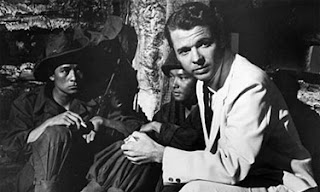 |
| The Book |
Is there ever a time when there’s not a war somewhere? Is there ever a time when we – the U.S.A. – are not involved at least covertly? Two films were made based on Graham Greene’s powerful novel, The Quiet American. Romance and suspense mix with a look at history as all unfolds in a literarily parallel construction.
I was in my early teens when the French failed to hold onto
their colonial interests in Vietnam. We didn’t know that the ongoing fear of the
Communists and a misguided belief in what was called the domino theory’ of
increasing Red dominance would lead us into an unwinnable and perhaps unethical
war – a lesson we failed to grasp then and now.
 The Quiet American (1958) – Because of 50’s political fall out
in the U.S. (the commie scare”) the film written and directed by Joseph L. Mankiewicz diluted Greene’s
anti-war message and the U.S. complicity in atrocities. World War II
hero-turned actor Audie Murphy
played the innocent – or is he? – American, and Michael Redgrave portrayed the older, cynical journalist. The story
of Vietnam’s dependence on their colonial ruler is a parallel to the young and
lovely Vietnamese woman’s dependence on the British journalist. Is it love?
This version was shot in black and white, which may account for its grittier
appeal. We don’t get to see much of
Michael Redgrave (father of Lynn and Vanessa) in film. He does a fine job here.
The Quiet American (1958) – Because of 50’s political fall out
in the U.S. (the commie scare”) the film written and directed by Joseph L. Mankiewicz diluted Greene’s
anti-war message and the U.S. complicity in atrocities. World War II
hero-turned actor Audie Murphy
played the innocent – or is he? – American, and Michael Redgrave portrayed the older, cynical journalist. The story
of Vietnam’s dependence on their colonial ruler is a parallel to the young and
lovely Vietnamese woman’s dependence on the British journalist. Is it love?
This version was shot in black and white, which may account for its grittier
appeal. We don’t get to see much of
Michael Redgrave (father of Lynn and Vanessa) in film. He does a fine job here. The Quiet American (2002) – Time is supposed to provide
perspective. Though it didn’t in the case of U.S. foreign policy with regard to
Indochina, it did with the two films about the French and ultimate American
failures there. With the benefit of hindsight, the2002 filmmakers wisely held
closer to Greene’s book. Phillip Noyce directed the remake. One
of the major differences between the two films is that number two is shot in
color, giving us a deeply sensuous look at an extraordinarily beautiful country.
The difference is that this version realizes Greene’s dark vision of human
behavior as it applies to the actions of nations and individuals, and the very
sad fact that most of us do not know whom to trust. Brendan Fraser plays the seemingly idealistic American in French
occupied Vietnam and Michael Caine
the cynical British journalist. Caine
won an Academy Award for his role. Do
Thi Hai Yen was just right as the young Vietnamese woman, the object of
love or desire by Fraser and Caine.
The Quiet American (2002) – Time is supposed to provide
perspective. Though it didn’t in the case of U.S. foreign policy with regard to
Indochina, it did with the two films about the French and ultimate American
failures there. With the benefit of hindsight, the2002 filmmakers wisely held
closer to Greene’s book. Phillip Noyce directed the remake. One
of the major differences between the two films is that number two is shot in
color, giving us a deeply sensuous look at an extraordinarily beautiful country.
The difference is that this version realizes Greene’s dark vision of human
behavior as it applies to the actions of nations and individuals, and the very
sad fact that most of us do not know whom to trust. Brendan Fraser plays the seemingly idealistic American in French
occupied Vietnam and Michael Caine
the cynical British journalist. Caine
won an Academy Award for his role. Do
Thi Hai Yen was just right as the young Vietnamese woman, the object of
love or desire by Fraser and Caine.
To accompany the double feature, it should probably be
something French. Pernod, maybe? A white wine? Perrier? You decide.


